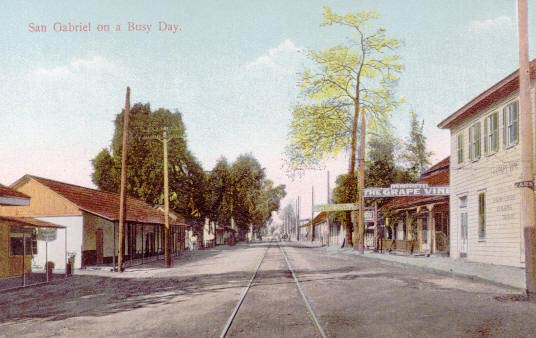
A Visit to Old Los
Angeles and
Environs
20. San Gabriel, Eagle Rock, and
Casa Verdugo.
by
Brent C. Dickerson
Copyright © Brent C. Dickerson
Index to Episodes (click here)
• While Anna, young Frederick Johan, and I traveled to the waterfront, Papa, Mother, Charley, and Minnie went inland. "I cannot," declared Minnie, "bear one more ocean breeze—no, not one!" At this, Aunt Sigrid set down the coffee pot—you see, it was breakfast-time—looked at her canary—did I mention? It was Aunt Sigrid's habit to look at her caged canary when she had thoughts to compose, or something to remember—and said, "I should think there would be no ocean breezes inland." "Inland?" queried Papa; "'inland' covers a great deal of territory, Sigrid!" Aunt Sigrid looked at her canary again. It was during this pause that our party affirmed its seaward determination, ocean breezes or no ocean breezes. "If you are feeling pious tendencies . . . " Sigrid started to say. Mother set the lid of the sugar-bowl down rather loudly on the table, and said, "Pious tendencies would suit Charley and Minnie quite well today, I do believe! Not to mention myself!" Nominated perforce for a day of piety, Charley and Minnie turned a bit wan, or so I was told that evening by my aunt. "All ears!" said Papa, "I'm all ears, Sigrid." "Visit the old mission at San Gabriel, east of town," said Sigrid, turning back to us from her canary; "the group of settlers that founded Los Angeles walked and rode to the city-to-be's site from there." "It sounds…rather historical, as well as pious," Charley noted, with a sigh. "But certainly," said Papa, at the breakfast table, "at times, no doubt piety will give way to excitement!"

• "Well," cried Minnie when they arrived, "it doesn't get much more exciting than this!" Papa thought for a moment, then said, "This would be one of the pious moments." First, the whole trolley-full of people had their photograph taken in front of the mission church.
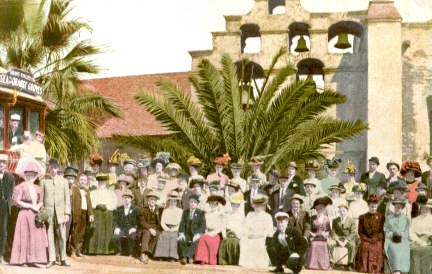
• The now-flowery living quarters adjoined the church. The trolley-conductor was leaning against the wall, picking at his teeth with a toothpick and chatting up Minnie until Mother—with the baby in her arms— swept her away, saying, "No, Minnie dear—we were going to go this way..." as she led her towards the other side of the church.
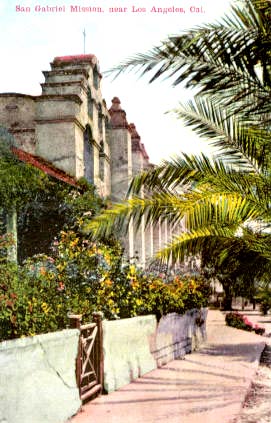
• Papa stood in the sunlight and beamed. "I feel as if I were in Old California, indeed I do!" Charley had just said that the señoritas seemed rather on the elusive side at the moment when Mother came around the corner with Minnie. Stretching out an arm, Papa called out, "Take a look, Mrs. S"—he called Mother "Mrs. S." in public—"it's a page out of the past!" Minnie, a bit out of breath from being run around from the other side, said, "The locals certainly do manage to drape themselves picturesquely on the building."
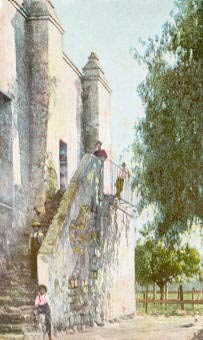
• Before going on to the inwards of the mission compound, they stood back to take in the whole. (I had adjured Charley to be serious about taking on my usual post of voyage reporter, as I am intent on keeping my promise to you about passing each moment in review before you, dear.)
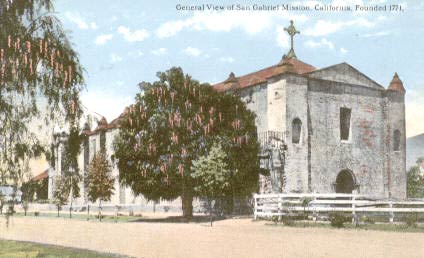
• They passed through the courtyard on the way inside. Charley read from a sign, "The oldest rose in California." "Very likely," said Papa. Mother gave him a stern look; "Faith!", said she. Minnie remarked, "I should think 'hope' or 'charity' more pertinent in this connection." Papa winked at her as they all went inside.
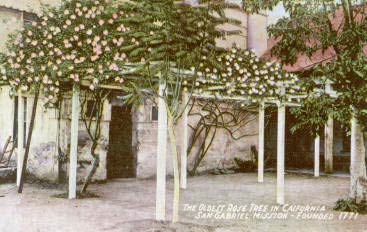
• " 'Tis a bit musty and dark," declared Minnie after a quick glance about. "Now, Minnie," said Charley, with a straight face, "it is at such moments as these that inner piety must transform the musty and dark into something glorious." Mother gave a heavy sigh. "I fear that our Charley has ironical tendencies." Papa slapped his hand on one of the pews. "I am shocked, astonished, overwhelmed to hear it! Where on earth, where I ask you, could he have learned such a thing?" Mother tensed her lips and stood in silent prayer for several minutes.
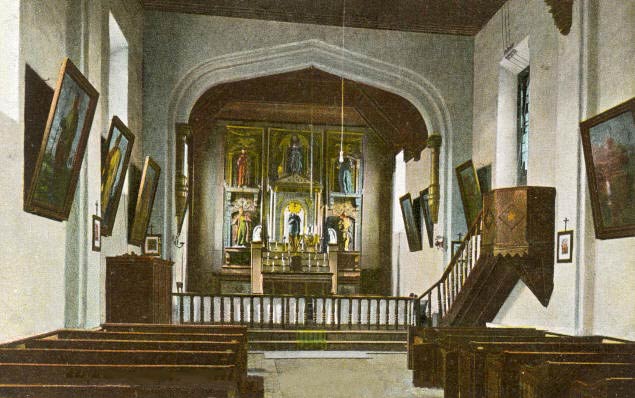
• Meanwhile, the others stepped into the tiny baptistry.
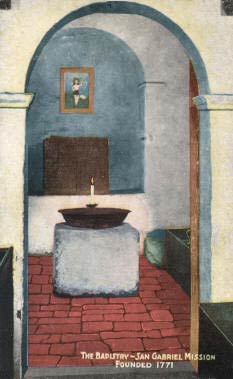
• One by one, they went out into the bright sunlight, and came to the mission's old graveyard. Minnie bestowed a bit of a frown on it. "This would be another one of the pious moments," said Papa. Mother stood, carrying the baby, at a tiny, weathered cross for a child, while Charley straightened some pickets around a family's plot not far away.
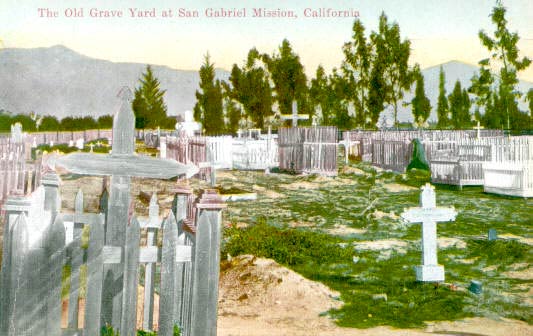
• From a distance, and from a certain angle, the mission looked solitary and peaceful, as it must have looked generations ago. —Well, dear, just as I wrote that, young FJ sneaked up behind me, read it, and exclaimed, "No, I think that's incorrect. A few generations ago, it would have been surrounded by Indian apartments..." "Apartments?", I remonstrated. "Well, whatever they called them, they amounted to apartments. And people would have been scurrying around doing, um, doing..." "Needful things," Mother called out from the hallway. "Yes, that's it exactly," said FJ with a smile of satisfaction; "Indians would have been around in their apartments, and people in general would have been scurrying around doing needful things." And so, dear, that's your very precise idea of life in Old California.
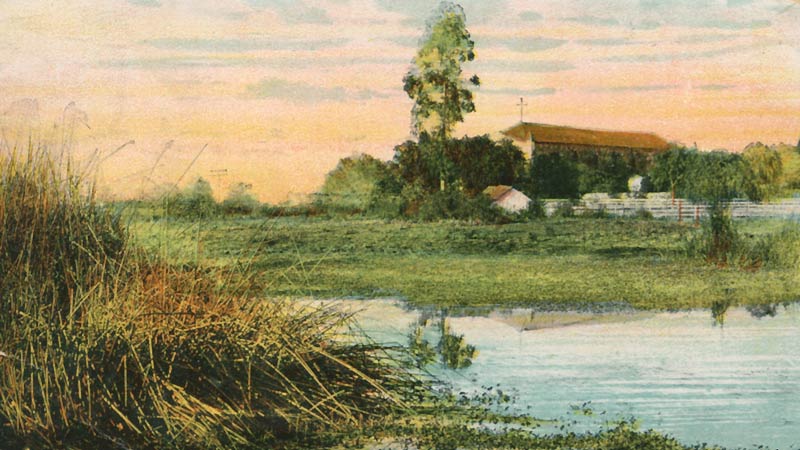
• A few yards down the street on the
otherwas a little lunchroom called "The Grape Vine." Charley
admitted to harboring hopes of a taste or two of wine; but they all found
it to be—to varying degrees of satisfaction or
non-satisfaction—a tea-and-sandwiches concern. Charley read a little
leaflet, and announced that the vine shading the outdoor tables was a
remnant of those planted by the mission inhabitants "before our Great
Nation was a nation" (quoth Charley). Mother ventured that "perhaps
if they had drunk less wine they too would still be
here."
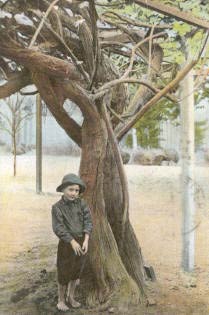 | 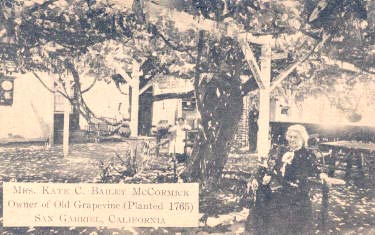 |
• On the way out of town, Papa
once again declared himself in an "old California" mood on seeing the
remnants of those years in various states of repair scattered along the
route. " 'Tis most romantic!" sighed Minnie in the direction of the
trolley driver. Charley responded, " 'Tis most drafty, from the look of
some of them." Mother was in a mood all her own, and followed Charley's
statement with, " 'Tis a fact that there's quite a lot of draftiness in
romance!", and no one felt moved to ask her to
explain.
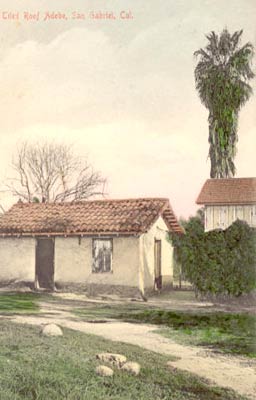
• On seeing a sign indicating the community of Eagle Rock, Mother broke into peals of laughter. "Chester had said just the other day that we'd want to take in 'that natural phee-nom Igglera' before we moved along, and I really didn't dare ask him what he meant!" "Well!," said the trolley conductor, with a rather listless look, "Eagle Rock is something of a natural phenomenon—and now's your chance to take it in." Overriding Minnie's objections, they all got off the trolley to see "Igglera."
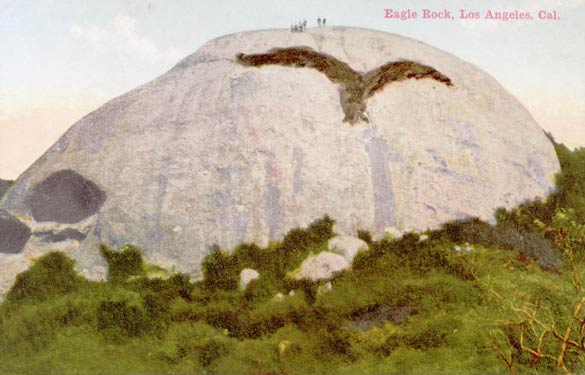
• The men thought it admirable, Minnie found it "oppressive," and Mother pronounced it to be "without a doubt, a large rock." They hurried through the park back to the trolley tracks to catch the next car, as the day was getting on.
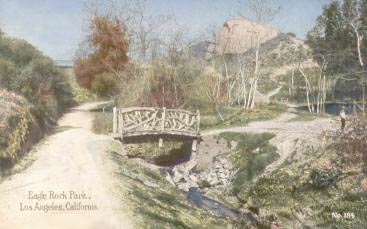
• A trolley came up just after they had arrived at the stop. Minnie bit her lip. "Oh, Papa—do let us wait for the next one! Look at his nose!" "Minnie dear," said Papa, "I'm sorry but we can't arrange our travel around the ornamental qualities of trolley drivers. All aboard, now." After a few miles—Minnie was pouting, but Charley reports that there was a girl with very pretty brown eyes next to him—Papa turned from the window and said, "Now for a little surprise. We're going to eat with Los Angeles pioneers." "Surely they would be about a century old…?" said Charley. "Well, in truth, it's the restaurant of their descendants—Casa Verdugo—and here we are right now!" cried Papa, as they pulled up in front of an old adobe.
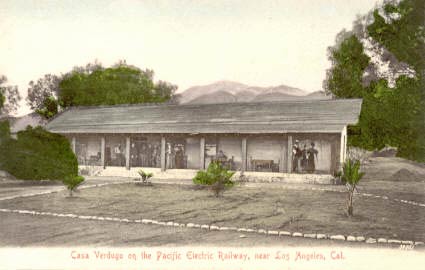
• There's romance for you, Minnie!", Charley teased as they alighted from the trolley. "Ruins is not romance, brother dear." Mother, feeling light-hearted because Papa was holding the baby, declared, "It looks foursquare and delightful, Minnie; just the place for castanets and a fandango or two!"
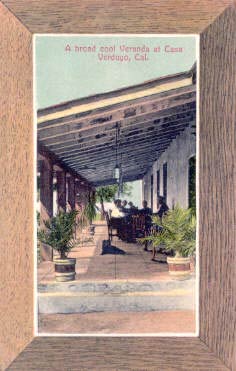
• Waiting for them in the shade of the veranda was Papa's friend, the old gardener from East Lake Park, who, as Charley gathered, had recommended the restaurant as "absolute authentic California, yes, sir!" during Papa's lunch with him at the park. He led the lot of them 'round back, where, as Charley put it, it was "a scene straight out of Ramona," with dining tables set along pergolas around a corral, in which a show of Mexican music and dance was going on. After what Charley reported to be "the hottest dinner this side of Hades," the performers coaxed Papa and Mother to join them, separately, in a dance. Now, as you know, Mother was well able to shake a leg once upon a time, and gave her señor quite a run for the money, while Papa, with a señorita from the performers, made up in energy what he lacked in technique. "I fear," he later said, "that my contribution was perhaps not completely authentic." Afterwards, there was a general fandango, and they all danced away the evening—Minnie said that the old gardener's beard kept blowing into her face as they danced—while, back at Aunt Sigrid's, Anna, young Frederick Johan, and I were studiously shaking sand out of our shoes and clothing.
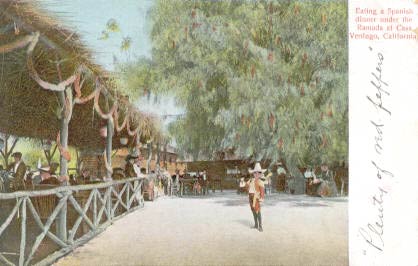
• The restaurant's white dog walked the diners to the trolley-stop as evening fell, "To protect you against banditos, señora!", as the waiter said to Mother. Papa bade the old gardener a warm farewell full of thanks; and the whole party arrived safely home—but long after the rest of us had gone to sleep. Come to find out, the next morning—that whole little dialog with Aunt Sigrid about San Gabriel had been carefully planned by Papa to set up the surprise.
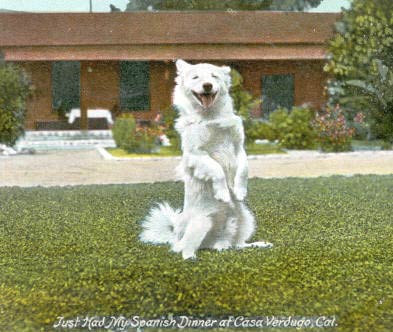
Return to Ocean Park; or on to Pasadena, Mt. Wilson, and Mt. Lowe . . .